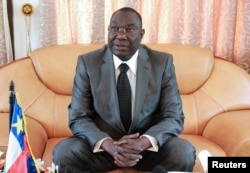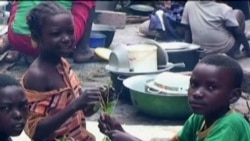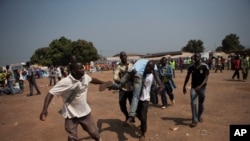DAKAR —
Central African heads of state are meeting in Chad to discuss the crisis in the Central African Republic. The country slid into anarchy after rebels toppled the president last March. The CAR government is denying reports that regional leaders will call for interim president, Michel Djotodia, to step down at Thursday's summit.
The communal violence that erupted one month ago in the Central African Republic capital, Bangui, has killed more than 1,000 people nationwide and prompted the rapid deployment of French and regional troops.
Central African heads of state who have been trying to mediate this crisis since the start of the Seleka rebellion in December 2012 are meeting in N'djamena to assess the situation.
Some news agencies are reporting that regional heads of state are fed up with former rebel leader turned interim president Michel Djotodia, and may demand his resignation.
The CAR government says that is not true.
CAR presidential spokesman Guy-Simplice Kodegue told VOA the summit is a check-in on the security and political situation and has "nothing to do with" any change in leadership before the end of the transition.
Elections are expected in about a year and Djotodia says he will not run.
But analysts tell VOA that is far from the complete political strategy the country needs to get out of this mess.
Central Africa expert at the Paris-based National Center for Scientific Research, Roland Marchal, says the government has not done much over the past eight months, but removing Djotodia would not be a magic solution.
He says it is unclear who would replace Djotodia, if a new government would do more than the current one or if the country gets a president this time around who is truly dedicated to national reconciliation, something he says the current government has failed on.
Things took a fresh downturn in the Central African Republic on December 5 when mostly Christian militias, alongside forces loyal to ousted president Francois Bozize, attacked the capital.
The violence descended into sectarian killing in the streets, with the country's Muslim minority being largely associated with the ex-Seleka rebels, who are also Muslim.
Serious abuses by both sides have fed communal tensions during the past year.
Watch Mike Richman's video report:
Djotodia has presided over a steady slide into lawlessness. In particular, he has come under criticism, even from his own camp, for his failure to control unruly rebel fighters after the takeover.
The communal violence that erupted one month ago in the Central African Republic capital, Bangui, has killed more than 1,000 people nationwide and prompted the rapid deployment of French and regional troops.
Central African heads of state who have been trying to mediate this crisis since the start of the Seleka rebellion in December 2012 are meeting in N'djamena to assess the situation.
Some news agencies are reporting that regional heads of state are fed up with former rebel leader turned interim president Michel Djotodia, and may demand his resignation.
The CAR government says that is not true.
CAR presidential spokesman Guy-Simplice Kodegue told VOA the summit is a check-in on the security and political situation and has "nothing to do with" any change in leadership before the end of the transition.
Elections are expected in about a year and Djotodia says he will not run.
But analysts tell VOA that is far from the complete political strategy the country needs to get out of this mess.
Central Africa expert at the Paris-based National Center for Scientific Research, Roland Marchal, says the government has not done much over the past eight months, but removing Djotodia would not be a magic solution.
He says it is unclear who would replace Djotodia, if a new government would do more than the current one or if the country gets a president this time around who is truly dedicated to national reconciliation, something he says the current government has failed on.
Things took a fresh downturn in the Central African Republic on December 5 when mostly Christian militias, alongside forces loyal to ousted president Francois Bozize, attacked the capital.
The violence descended into sectarian killing in the streets, with the country's Muslim minority being largely associated with the ex-Seleka rebels, who are also Muslim.
Serious abuses by both sides have fed communal tensions during the past year.
Watch Mike Richman's video report:
Djotodia has presided over a steady slide into lawlessness. In particular, he has come under criticism, even from his own camp, for his failure to control unruly rebel fighters after the takeover.








